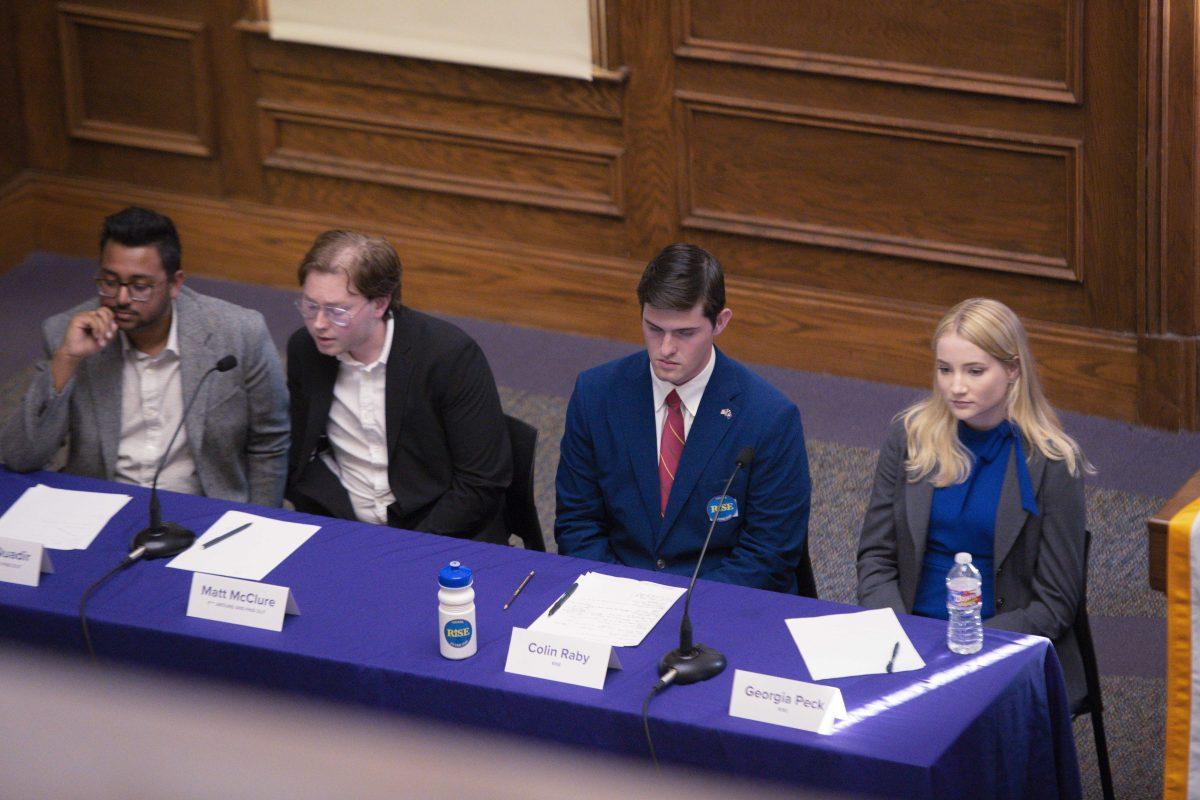When Student Government announced election results last week, there was one winner and three losers; however, even before voting began, there was a clear loser—the First Amendment.
In a bold move, one of the tickets vying for victory named itself “F*** Around and Find Out,” with the curse word uncensored. On March 31, the ticket appeared on the ballot as “F*** Around and Find Out” after the Election Commission voted to censor the name, and the judicial branch upheld the decision in the case FAFO v. Election Commission.
While The Reveille may be beholden to AP style, SG is not, and this decision has troubling implications.
With only three letters at the heart of the issue, invoking the First Amendment may sound melodramatic, but censoring the ballot raises genuine questions about SG’s understanding of the First Amendment and its commitment to uphold it.
Alarming issues arise when reviewing the Election Commission’s rationale for censoring the ticket name, such as the notion that a voting consensus could reasonably justify censorship.
The number of asterisks on the ballot was “democratically selected,” Inspector General Riana Shelley testified. “This was not one person deciding she was personally offended.”
It does not matter whether one person, a commission of five or a group of 5,000 labels something offensive or unpleasant—censorship is censorship. Legitimizing censorship based on numbers is antithetical to the very nature of free speech, which exists to create a vibrant marketplace of ideas where the majority cannot snuff out beliefs it deems undesirable.
Labeling the meaning of expression is also remarkably subjective. In the words of Justice John Marshall II, “one man’s vulgarity is another’s lyric.” The Election Commission seemingly disregarded this reality when describing its authority.
“The public nature of the voting system allows those in charge of its distribution (Election Commission) the legal right to censor potentially inflammatory content to preserve the sanctity of Student Government, which serves all students whether they voted or not,” the Election Commission’s court brief said.
The Election Commission’s assertion of its so-called “legal right” is concerning. Censoring some students in the name of serving “all students” is oxymoronic. Moreover, even though this case revolved around an expletive-laden ticket name, the meaning of “potentially inflammatory content” is so broad that it could be construed to restrain all manner of political speech.
Censoring certain words or expletives would create inconsistencies where tickets or candidates receive unequal treatment. If a student named their ticket “Don’t Be a Dick,” would it be fair to censor it? If the answer is yes, would we then censor a student who wants to use the nickname “Dick” on the ballot? It’s the same word after all.
By the same token, the Election Commission references “devout religious individuals” when describing discomfort with profanity. Why then would the commission not censor a ticket name like EVOLVE? It has no expletive, yet it references a theory that some may find blasphemous.
Justifying ballot censorship in the name of SG “sanctity” could also mean the suppression of dissent. Surely, a ticket name directly criticizing an administrator or a segment of campus like Greek Life or Athletics would displease more people than a simple swear word. If such a name was uncensored, the commission’s reasoning would fall apart.
By referencing the need to uphold SG’s “sanctity,” it appears that the Election Commission employed the doctrine of “government speech,” which it alluded to more directly.
“Once the ballots are formed, it is no longer the campaign that is promoting their name directly,” the Election Commission’s brief said, “but rather they are being referred to indirectly by a new authority who controls the ballots and thus receives their own rights of free speech.”
The government speech doctrine immunizes governments from First Amendment challenges because they can express their own ideas under certain circumstances. Historically, this applied to specialty license plates, monuments in public parks and advertisements in public schools.
However, the Election Commission—and the judicial branch—overlooked recent precedent that limits government speech.
In Matal v. Tam (2017) and Iancu v. Brunetti (2019), the Supreme Court ruled that offensive, disparaging or vulgar trademarks were not government speech and could not be rejected.
“Holding that the registration of a trademark converts the mark into government speech would constitute a huge and dangerous extension of the government-speech doctrine,” Justice Samuel Alito wrote in Matal v. Tam (2017), “for other systems of government registration (such as copyright) could easily be characterized in the same way.”
What is a ticket name if not a form of registration with SG?
On April 4, the Election Court released its final judgement allowing the censorship vote to stand as part of the Election Commission’s administrative role. The Court also stated that censoring the ticket name was an expression of the Election Commission’s speech.
I’m no legal scholar, but using government speech to censor ballots is a gross misinterpretation. Censoring a ballot is not the same as using a censored placard or the debate moderator choosing to say “Eff Around and Find Out” on a livestream sponsored by SG.
A ballot is a passive conduit, the most basic voting tool—not an expression of the Election Commission’s values or opinions.
Again, it may seem like I’m overreacting, but this case of censorship has uncertain implications for future SG elections. At the very least, it’s a myopic attitude to the First Amendment; at its worst, it’s an open disregard for its nuances.
Drake Brignac is a 21-year-old political communication and political science senior from Baton Rouge.
Opinion: Student Government censored free speech in First Amendment folly
April 12, 2022
LSU student government F*** Around and Find Out campaign and Rise campaign represent themselves Thursday, March 24, 2022, at the Student Government debate in the Journalism Building on LSU’s campus in Baton Rouge, LA.





